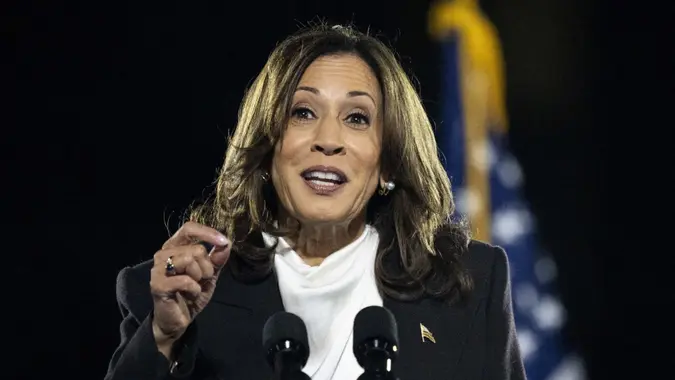Op-Ed: Let’s Face It — Kamala Harris Would Have Been Better for the Economy

Commitment to Our Readers
GOBankingRates' editorial team is committed to bringing you unbiased reviews and information. We use data-driven methodologies to evaluate financial products and services - our reviews and ratings are not influenced by advertisers. You can read more about our editorial guidelines and our products and services review methodology.

20 Years
Helping You Live Richer

Reviewed
by Experts

Trusted by
Millions of Readers
When millions of people cast their votes to re-elect Donald Trump to the White House last November, one powerful factor was Trump’s perceived superiority on the economy. In polling up until the election, Trump maintained a slim yet consistent lead on economic issues. Even voters who weren’t fans of other Trump policies, or the man himself, were swayed by promises of lowered prices for consumer goods — particularly groceries.
Although, given the current economic climate, one wonders if some of these voters wish they had a time machine to change their vote to former Vice President Kamala Harris. Jokes and memes about the high cost of eggs abound, because consumer prices for eggs continue to trend upward, with the stress compounded by worries about Trump’s tariffs igniting trade wars.
And that’s not even factoring in the roller coaster of the stock market — not the fun kind of roller coaster, but the kind that makes investors feel nauseous.
It may be time to admit it: A President Kamala Harris would have been better for the economy.
A Harris Administration Wouldn’t Have Gotten Us Into Tariff Trouble
One of the cornerstones of Trump’s economic policies, tariffs have also become the millstone around his administration’s neck. Writing for Quartz, Kevin Williams crunched data from a CNBC poll, observing that “the president is registering the worst economic approval numbers of his political career as the public digests his handling of economic policy and his on-again, off-again tariff regimen.”
The aftershocks of Trump’s tariff policy have been so enormous that even financial experts overseas can’t help but take note. For Austin Rulfs, founder of Zanda Wealth, Harris’ plans offered a more balanced approach to economic growth, with future-forward strategies for expanding healthcare, improving infrastructure, and investing in clean energy — all of which would have strengthened the economy while creating more jobs and stability.
Conversely, Rulfs sees Trump’s tariff policy as disrupting global supply chains and increasing costs for consumers and businesses. As if this weren’t bad enough, it created ripple effects that are even being felt within the real estate market.
“When tariffs hike costs, they impose unnecessary pressure on the affordability of goods and services. This pressure directly impacts consumer confidence and the people’s ability to invest in homes and build their savings,” he said. “Harris’s focus on international collaboration and trade agreements would have greatly mitigated this risk.”
Rulfs is direct in his assessment that a more stable, predictable trade environment would have benefited American families by boosting disposable income and enabling them to invest with greater confidence.
Harris’ Child Tax Credit Would Have Benefited Families and Local Economies
One of the crown jewels of Harris’ platform was her child tax credit proposal, which would have given families $6,000 per child during their first year of life. When Odellé Joubert, growth and operations manager of Dentaly Go — whose work relies on her strong background in macroeconomics, microeconomics and statistical methods for business — reflects on what was lost economically when Harris lost the election, the benefits to families tops the list.
“Kamala Harris’s proposals were structured around direct support for working families and long-term economic security. Her tax credit plan … would have given new parents meaningful support during one of the most expensive periods of early parenthood,” she said. “That money would have gone straight into essential spending such as childcare, rent, food and transport, which keeps money circulating in local economies.”
When households in these brackets receive relief like this, they tend to put the money back into their local economies. Joubert adds that this impact would have been quick and widespread, strengthening demand for goods across communities.
Healthcare Policies Impact the Health of Your Wallet
As the Affordable Care Act again finds itself in jeopardy — Senator John McCain famously stopped outright repeal during Trump’s first term — middle- and lower-income Americans find themselves in both a human and financial quagmire.
The Trump administration’s initial plans to repeal the ACA without a comprehensive replacement created uncertainty in the healthcare market, leading to higher premiums for many.
“Harris supported strengthening the ACA which would have provided more stability for middle and lower-income families, reducing out-of-pocket medical costs that often strain household budgets,” said Joubert.
Bottom Line
In a world where Kamala Harris was inaugurated as the 47th president, the country’s economic reality would likely feel very, very different.
According to that CNBC poll, about 49% of the public is steeling themselves for the economy to worsen next year, while 55% of those surveyed disapprove of Trump’s overall handling of the economy.
And if you don’t take the word of everyday Americans, consider that even elite institutions like JPMorgan are now upping the odds of a recession.
More From GOBankingRates
 Written by
Written by  Edited by
Edited by 

























